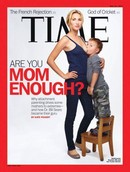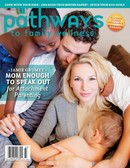The Inadequacy Industry: How the Media, Government and Corporations Trick Us Out of Common Sense
 The Inadequacy Industry
The Inadequacy Industry
The Inadequacy Industry – my term for the collusion between media, government, and corporations to trick us out of our common sense on anything from how we grow food to material desires to how different we’re allowed to be before being ridiculed – creates controversy to divide its audiences, customers, and constituencies. If we turn off the noise machines and think about where the message stems from, as in who benefits from spreading it, we learn about the presence of ulterior motives.
Generally, the answer to “What were they thinking?!” is money. When Time magazine slapped a photo of a woman breastfeeding a three-year-old and the angry red words “Are You Mom Enough?” they knew exactly what they were doing. Hackles were raised. Divisions became clear. Parenting, a longtime gambit of the Inadequacy Industry, was back in the limelight. Fight! Fight! Fight!
![Gotcha! image]() Gotcha!
Gotcha!
Time got its wish. The magazine gained a lot of attention and probably sold a lot of copies. And they allowed people to judge the story by the cover. Paywall protected at first, most of usonly saw the cover. That’s all we could talk about. Why is that boy on a chair? The in-your-face taunt about being mom enough made Jamie Grumet, the mom in the photo, seem to be challenging the rest of us. I thought so when I first viewed the cover. The deconstructed cover shows a placid, non-aggressive Grumet. In fact, the pose was neither posed nor planned. Speaking to Pathways to Family Wellness for the Fall issue’s cover story, she tells a different story, ”We were hugging each other, but he dropped his arms because he was tired and it was his naptime. We were moving around and trying different things, but they just happened to catch the shot.” When you read the article to which the cover points about Dr. Bill Sears and attachment parenting, Grumet is quoted but once, though an online supplement includes her interview. Her appearance on the cover got the Internet buzzing, though.
Sara and I consider ourselves attachment parents (AP). We were raised by moms who practiced similar principles before they were codified in print by Dr. Sears. For us, AP means meeting the needs of our child with flexibility, allowing for fluidity in the moment rather than maintaining rigid preconceptions of the parent-child relationship. We’ve used Sears’s book as a guide to help us in decision making about what is right for our daughter, Kalia. Not quite orthodox in our actions and mindsets throughout our lives, we take the advice that works and discard that which doesn’t. Among our practices that align with AP philosophy include co-sleeping, nursing, not “crying it out,” and consensual weaning. We carry and hold Kalia a lot of the time, though we also use strollers. We also have a floor crib for her to fall asleep and afford her Mama with a few extra hours with me before hitting the hay. As a stay-at-home dad, I’ve also found the ladybug helpful when I need the bathroom. We stare at each other from our perches. It gets the job done.
 Mythbusting: The Photo is Innocent; Our Minds Are Not
Mythbusting: The Photo is Innocent; Our Minds Are Not
The online debate about the Time cover had already been raging when I jumped in. By the time I got there, the debate encompassed the photo and the act of breastfeeding itself. Sleep arrangements also dominated discussion. Because our style of parenting does not fit in with the mainstream and the Inadequacy Industry’s preferences and due to my being a somewhat uncertain first-time father, I had made a conscious choice to remain mute about our practices. I ended my silence as the conversation led away from nursing at three years to people condemning folks who nurse past 6 weeks! The mainstream-influenced voices led the attack. Playing defense, I noticed that evidence was dismissed by feelings. The anti-AP people I interacted with uniformly believed the following: AP folks are troubled people who need to assert dominanceand if you believe in co-sleeping, you are advocating infanticide.
In a column I posted on MindBodyGreen, I noted that online posters called Grumet “sick,” referred to her feeding practice as “child molestation” and “laziness,” and claimed this was “sexualizing children.” Accusations of pedophilia even reared their ugly head. To me, these responses represent a societal fetishization of the female human breast. Our culture has long equated the human breast with something sexual, denying the fact that bare-breasted women exist as a matter of course in many places. The beholder of the photo sexualized the child, not Grumet. I wrote, “The photo is innocent. Our minds are not.”
Feeling game to advocate holistic parenting, I encountered three main theses from the anti-AP crowd, detailed as they came, below.
![]() Co-Sleeping: "Killing the Child, Selfishly Creating Coddled Children"
Co-Sleeping: "Killing the Child, Selfishly Creating Coddled Children"
Co-sleeping involves bringing a baby into bed with you. It’s done in other cultures to no great harm, but here in the United States the sirens blare that if you co-sleep you’re putting your child in danger. Furthermore, many assert that by answering a baby’s cries instead of letting her cry it out, she will be endlessly dependent on the parent and needs to learn to be independent.
Taking those in order: Milwaukee made headlines a short while ago when it showed babies sleeping next to large knives, intoning that sleeping in bed with baby is as dangerous as them sleeping with a blade. Certainly, there have been many instances of deaths in Milwaukee (and elsewhere) involving another person sleeping with a baby. To conflate this with co-sleeping is irresponsible, because co-sleeping involves a host of rules one must follow. When I searched Milwaukee’s deaths online, I found out one mother was excessively tired from work, another person was inebriated, and siblings and babysitters brought babies into bed. None of this follows co-sleeping protocol.
When I pointed that out to online commenters and pointed them to the resources AP parents use for proper co-sleeping, they did not take the rules into account. If you were sleeping next to a child, whether drunk or properly aligned, you were in the same boat. Also, according to them, if you were co-sleeping, you were expressing some deep need to create a dependent brat.
The “cry it out” crowd reports tremendous success in getting their children on schedule. Sara and I believe in having the parameters of a schedule, but also know that the undeveloped mind cannot understand why its pleas for attention go unanswered. Since baby cannot communicate with words we understand, she lets us know through wails and squeals. Sometimes they are just wails and squeals, while other times they express a need.
We cannot listen to Kalia cry for too long and we see no need to punish her for having some need, even if that need is just, “I want to be close to you.” Physical contact is beneficial to all animals. In order to tend our daughter at night, Sara has missed plenty of episodes of her favorite shows. If nurturing the baby we brought into this world forces us to sacrifice some of our free time (I write at night, because I’m caretaker during the day), we will make the trade. It is not easy, but it’s important. We could teach Kalia to cry until she’s exasperated, but what precedent are we setting? If you need us, we’ll be there at our convenience? She cannot process that, for there is no ability to reason. So we answer her.
To me, “crying it out” corresponds to an increasingly “you’re on your own” tone in the United States. What does it serve but the desires of the person in control. For us, parenting is less about dominance and more about coexistence. Therefore, we answer. And she is dependent on us for everything – feeding, clothing, washing, changing. Why should sleeping be any different at this point?
 The Family Bed: "A Cold Shrew Putting Hubby Out to Pasture"
The Family Bed: "A Cold Shrew Putting Hubby Out to Pasture"
One respondent in the hostile AP discussion, which surprisingly took place on a Facebook page I visit for holistic thought, asked what husbands thought of co-sleeping. The tone of her question showed that women were being bad wives if the husband’s sexual desires were secondary post-birth.
If my needs were at the forefront of Sara’s mind after Kalia was born, I would question Sara’s ability to mother our baby. If I insisted that she put me first, I would question my ability to father our baby. Romantic intimacy takes a step back while interpersonal intimacy grows exponentially when you welcome a new person into your cohort. And it should.
I have departed for the couch, because we have a full-size bed. In co-sleeping, Sara saves herself getting up and down for night feedings. On the couch, I build my energy reserves for watching the kiddo alone during daylight hours. Our love for each other is as deep as ever, perhaps more so as we observe each other becoming parents. I know that the Inadequacy Industry has spent more than a decade presenting fathers as doddering cavemen who cannot control their urges. That’s not our reality. The romantic flame still shines, but it isn’t foremost in our minds. Growing a child is.
![]() Breastfeeding: "Ew! We’re Not in the Third World, So Give Them Food Now!"
Breastfeeding: "Ew! We’re Not in the Third World, So Give Them Food Now!"
I never saw myself as a breastfeeding crusader. I havewritten many times about how our bodies have been shoved into a closet of shame in the United States, but I hadn’t seen the wonderful machinations of nursing at work. The World Health Organization (WHO) calls for a minimum of two years of nursing for a child’s health. Breast milk, as only it can, provides nourishment, immunity, and prebiotics to set a baby’s wellness parameters for life. Too often, women are discouraged from nursing in the United States. What health care bills could be avoided if we had a more encouraging society?
In the discussion forum, the anti-AP crowd declared Grumet to be selfishly unable to let go of her child by extending breastfeeding. Some issued directives as to when moms should withhold milk. All of them went against the WHO recommendation, most determining that six months was more than enough time. Some felt six weeks was best and then it was time for formula. In a different era, industry convinced us that formula was better than mother’s milk, though we now know that to be untrue. Sara’s aunt was fed karo syrup, which was considered a proper ingredient for formula during that era. Karo syrup was doctor approved!
If a mother cannot nurse, she should not be shamed. If she can nurse, we must make the road as easy as possible for her to keep doing so as long as she and baby want. Sara nurses and expresses milk as we approach a year because it is healthy for the baby. Kalia is not ready to give up the milk and Sara maintains her supply. Knowing the health implications, we plan to continue along this course. We will practice consensual weaning and it will be a decision between Sara and Kalia. Jamie Grumet has nursed later than most in our culture, though in line with other societies around the world. Her sin seems to be less that she still nurses and more that she’s unashamed.
Sara does not enjoy the spotlight on her. When she fed Kalia while grounded in a plane in California without a coverup, she was well within her rights according to California civil code. A flight attendant thought otherwise and embarrassed her by forcing her to cover up. After this incident, I went after the airline to make up for a miserable flight, becoming well-versed in breastfeeding politics. I refused to relent and after three months won us refunds for that flight. I took the cause of nursing to the CEO and senior management at the airline. Only then did we receive just compensation. A lot of work, but worth it to make sure people can nurse in peace – something few and far between in the U.S.
 Lessons from Time
Lessons from Time
Grumet ultimately feels vindicated by the whole experience. She told Pathways, “There were people who discovered what attachment parenting was and said they would not have known without the cover. That’s exactly what we wanted, and I cannot ask for more than that. There is definitely good coming from it.”
For those of us who took to the trenches to advocate principles of AP, we hope we contributed positively to the debate. Many people I encountered finished corresponding with the biases with which they began. Not much seemingly was heard. Hopefully, people reading my and other responses found out that not all sleeping together is co-sleeping, breastfeeding is a gloriously good activity, and that when we consciously add a new human to our brood, priorities properly shift.
Birth is a journey’s continuation, a transition from preparation to the arrival of someone new. We make it our job to actively attend to the needs of the one person who cannot grasp the enormity of the situation. We do not have all the answers, but our approach works for our family. In the speeded up American society, this might seem inconvenient. For us, and many like us, it’s what we’ve searched for all along. Easy? Not always. But it sure is interesting.
And well worth the effort.




